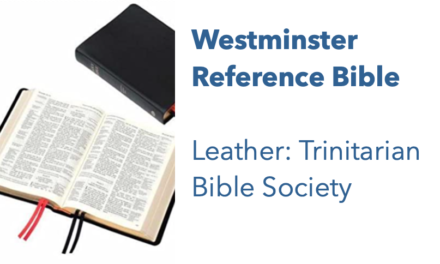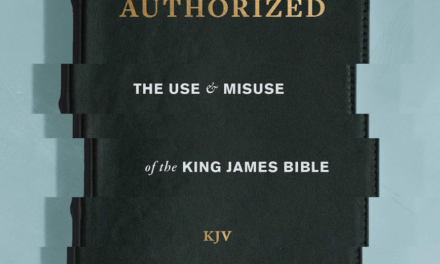
Theological Activism
& The “Perfect” Bible
By Taylor DeSoto
Introduction
A major goal that I have for this blog is to cut through waste of the “Textual Discussion” and dispel what might be considered “non-arguments” to make room for meaningful, theological, conversations. The reality is that oftentimes this discussion is more about who has the better polemic or rhetorical strategy than what is Biblical or true. Critical Text advocates often broaden or even change the meaning of established terms in order to make arguments that won’t work with the established theological lexicon. For example, James White, in the first chapter of his book The King James Only Controversy, has expanded the definition of “King James Only” to apply to people who adhere to Majority Text positions, those who simply prefer the KJV, and even those that do not read the King James at all. Modern Scholars such as Dan Wallace, Dirk Jongkind, and Richard Brash have redefined the term “Providential Preservation” to mean “Partial Preservation” and go on to say that Christians have “good access to” the original but not the original itself. Even further, many scholar-types redefine “The Bible” to mean “the extant manuscript tradition” or something similar.
The effect of this is that the layperson and even a more studious onlooker of the discussion often has trouble engaging at all. One would expect to be more informed after reading the authoritative work on “King James Onlyism,” but instead, they are not even given a helpful definition of the term. I’m sure we can all agree that a Majority Text believer who reads the NKJV is not a “King James Onlyist,” and yet we find such arguments in The King James Only Controversy by James White and How to Understand and Apply the New Testament by Andrew Naselli. Both of these texts are distributed as official reading material in Christian Seminaries.
If scholars and apologists cannot provide a clear definition of what exactly they are writing about, how can their audience be well informed? How can the layperson engage with the topic in a meaningful way? The reality is, they can’t, and that is apparent in nearly every conversation you will see pertaining to the topic of “TR Onlyism,” “KJV Onlyism,” and Modern Textual Criticism. The fact that I have to put quotations around terms should inform my audience that these definitions have been muddied to the point of being useless. It should be the case that the scholar class informs the people of God, and instead they have left them with unclear definitions and have paraded their personal opinions as fact. Much of this blog would be irrelevant if the scholar class simply stuck to scholarship, but instead they have engaged in theological activism.
Theological Activism and the “Perfect Bible”
Some readers may not appreciate the term “theological activism” but I can’t think of a better way to describe it when somebody makes such a severe categorical error as calling somebody who does not read the KJV a “KJV Onlyist.” I don’t know how else to understand why a scholar would redefine the Providential Preservation to mean “Partial Preservation” (i.e. Not preserved) if not to convince somebody that their position is the orthodox position, when it is clearly different. I could give dozens of examples of these misrepresentations and contradictions that are used in the name of propping up the Modern Critical Text and its translations over and above the Traditional Bibles of the Protestant church. One case of this theological activism is the notion of “no perfect Bibles.”
Scholars such as Dan Wallace, Mark Ward, and Richard Brash, among many others, have asserted that there are “no perfect Bibles.” Immediately we should take issue with this framing. We need to consider what is even meant by “perfect.” Does “no perfect Bibles” here mean that there are no complete Bibles? Does it mean that there are no Bibles that can’t be improved upon? In the case of the scholar class, they advocate for both. Unfortunately, these scholar types do not expand on the implications of this theological position. They say that “we have good access” to the Scriptures, and conclude by saying that “it’s good enough for me.” Despite the scholar class being okay with this, if it is the case that there aren’t any complete Bibles, then the people of God do not have all of God’s word. In other words, “good access” means “partial” or “incomplete” access. This is obviously not a Biblical position, nor is it the position of the historical Protestants.
If by “Perfect” we mean “complete,” then it is absolutely necessary for the people of God to have a “perfect” Bible if we also wish to maintain the doctrine of Sola Scriptura. While I will defend the notion of a perfect Bible, I find it more helpful to expand on this concept for clarity. The people of God need a complete, preserved text that is accurately translated in order to have the Word of God in their hands. See, when we throw words around like “perfect,” we leave room for syllable catchers to debate over terminology rather than understanding the theological point. “Perfect” means that something cannot be improved upon. This is true as it pertains to the original Hebrew, Aramaic, and Greek, if we believe that the Bible was Providentially Preserved. But as it pertains to translation, somebody will always be of the opinion that something can be better. They might admit that the words are translated accurately, and the meaning is accurately conveyed, but it’s not “perfect” because they like this word better than that word and so on and so forth.
The scholar class rejects Providential Preservation, as is apparent in their writings. They claim that we have “good access” and not “full access” to the Scriptures. They believe that the Bible is open to change based on further scholarship and manuscript discoveries. They openly admit that the Bible is changing, and therefore do not believe the Bible to be in a completed state. Many of these scholars, such as Dan Wallace, plainly reject the doctrine altogether. This is not a hot take, it is their words. Let’s suspend reality for a moment and suppose that these scholar types actually do believe we have a complete Bible in the original languages for one moment and discuss the issue of translation and a “perfect” Bible.
If we use the definition of “perfect” to mean, “cannot be improved,” then we can debate all day as to whether or not a “perfect” Bible translation exists. It should come to no surprise that the scholar class has chosen to use the most unclear terminology possible to frame this discussion around “perfect” translations. If we wish to be clear, what is required is not a “perfect” translation according to the definition above, but rather a translation that accurately communicates the original languages. A translation that accurately sets forth the original in a target language is for all practical purposes, “perfect.” This allows for somebody to have a preference for a different translational decision while also being able to admit that the translation they disagree with is still using an accurate word. The purpose for this theological definition is simply to communicate that what the Bible reader is reading is the Word of God, not whether the translators could have phrased something the way you would like it phrased. The question is not, “Could it have been translated the way I think it should be?” It is, “Is it translated accurately? Is the meaning accurately conveyed?” If the meaning of the original is accurately set forth, then the translation is “perfect” or “having all the required or desirable elements, qualities, or characteristics.” So yes, perfect translations are possible, and do exist. If you do not believe your translation is “perfect” in that sense, I’m not sure why you’re reading it. You should either read a “perfect” translation, or advocate that one be made that is “perfect” rather than complaining that none exist. If you believe the ESV isn’t “perfect”, you should either stop reading the ESV or be writing letters to Crossway every day until it is “perfect,” because “perfect” is possible, so as long as you believe we have full access to the original texts.
Therein lies the biggest problem. These scholar types, and those that adhere to their ideology, do not believe we have full access to the originals. According to them, we have “good access,” and that is sufficient for them. Even if they did believe a translation could be “perfect,” they do not believe that we have the required material to create such an object. Their problem is twofold. They do not believe God preserved His Word completely, and they do not believe that even if it were, it could be translated accurately enough to be called “perfect.” Both of these opinions result in one very dangerous reality – the people of God do not have in “all Scripture” in their hands when they open a Bible. They have “good access” to “all Scripture,” not full access.
Conclusion
Due to this two-fold problem, the scholar class has had to present their opinion as being correct over and above the “antiquated” notion that God preserved all of His Word and made it available today. Richard Brash attempts to resolve this issue by saying, “we don’t necessarily need every word all at once” (Richard Brash. A Christian’s Pocket Guide to How God Preserved the Bible. 62.) In other words, the Bible is preserved, just not available right now. He has to play with the definition of “preserved” in order to continue to defend the notion that the Bible is preserved. But who would say that a jar of pickles is preserved if we don’t know where the jar of pickles is? We may know that the jar of pickles existed at one point, and that the pickles were preserved, but we cannot say it is preserved unless we have it now. That is why the concept of availability is deeply connected with the doctrine of preservation.
This is yet another example of the contradictions and redefinitions required to maintain that the theology of the Modern Critical Text aligns with Christian Orthodoxy. Ironically, if we do not have the preserved original Bible, there would be no such thing as Christian Orthodoxy in the first place. Bart Ehrman explores this concept at great length in his book, Lost Christianities. If we do not have the full cannon, and further scholarship and manuscript discoveries can change the shape of the text, we effectively have an open canon. That is why scholars such as Michael Kruger have argued that simply having the proper list of Biblical books is enough to say that we have the canon. In order to defend the Modern Critical Text and a closed canon, one has to argue that the words in the canon have nothing to do with the preservation of the canon itself. The canon and the words in the canon are said to be preserved differently. The separation of the canon and text is yet another example of how the scholar class confuses the discussion because you cannot argue for a closed cannon and the Modern Critical Text if the words are considered. The reality is that books of the Bible are the substance of the words, not just the book covers.
The purpose of this article was to highlight the contradictions in the argumentation of those that advocate for the Modern Critical Text focusing on the claim that there “are no perfect bibles.” When we examine such claims, we can always find that terminology is being used too broadly or in such a way that actually changes the definition of that terminology. Such practices contribute to the confusion in this discussion are massively unhelpful. If it is the case that the Bibles we read are not “perfect,” or “having all the required or desirable elements,” what exactly is it that we are reading?




